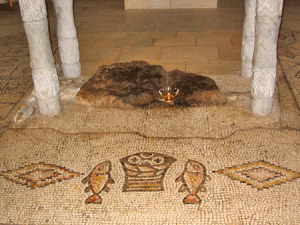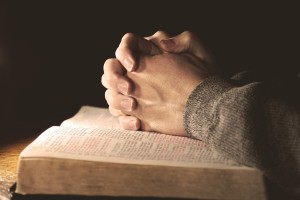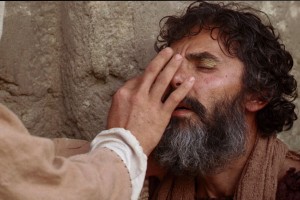====================
A sermon offered on Ninth Sunday after Pentecost (Proper 12B, Track 1, RCL), July 26, 2015, to the people of St. Paul’s Episcopal Church, Medina, Ohio, where Fr. Funston is rector.
(The lessons for the day are 2 Samuel 11:1-15; Psalm 14; Ephesians 3:14-21; and John 6:1-21. These lessons may be found at The Lectionary Page.)
====================
 So this is a very familiar story, right? Actually, two very familiar stories. We all know about the feeding of the 5,000. All four gospels – Matthew, Mark, Luke, and John – tell it with slightly varying details. We all know about Jesus walking on the water. Three of the four gospels – Mark, Luke, and John – include that tale, again with slightly varying details. We sometimes mix up those variations, but basically the stories are the same so no big deal.
So this is a very familiar story, right? Actually, two very familiar stories. We all know about the feeding of the 5,000. All four gospels – Matthew, Mark, Luke, and John – tell it with slightly varying details. We all know about Jesus walking on the water. Three of the four gospels – Mark, Luke, and John – include that tale, again with slightly varying details. We sometimes mix up those variations, but basically the stories are the same so no big deal.
The problem is that we know the stories so well that we don’t know what we don’t know about them. We think we know the whole story, but we don’t! And one of the things we don’t know, as Evie and I discovered when we were in Palestine last summer, is the geography of the feeding of the multitude. So I thought start with a sort of geography lesson, if that’s OK with you? OK?
OK.
I want you, first, to think about what you know about Lake Erie. You know that it’s up there, north of us somewhere. You know that at one end (the western end) are Detroit and Toledo and at the other (the eastern end) is Buffalo. You know that the far shore is a foreign country called Canada, and you know pretty well where the cities and towns are located along the American shore.
So now I want you take Lake Erie and rotate it 90 degrees. Buffalo is now at the lower end; Toledo is at the top; the foreign country called Canada is still on the far shore. If we come down the near shore from Toledo, we’ll come to (among other places) Maumee, Sandusky, Lorain, Cleveland, Ashtabula, Erie.
By rotating Lake Erie, we’ve oriented it in the same way the Sea of Galilee is oriented and, by a strange coincidence, many of the places we know of along the shore of the Sea of Galilee are in relationship to one another in much the same way as places we know along the shore of Lake Erie! So … Bethsaida – you remember Bethsaida, it’s where Jesus healed a blind man and it was the hometown of Philip, Andrew, and Peter – Bethsaida would be about where Detroit is. Capernaum, which Jesus sort of made his home base and where Peter actually seems to have lived, would be about where Toledo is. A place called Tabgha, which is probably where the feeding of the 5,000 took place, would be about where Sandusky is. Gennesaret, which is where Mark says the apostles were headed when they saw Jesus walking on the water, would be about where Cleveland is. Tiberias, a resort city built by Herod Antipas (the king who beheaded John the Baptist), would about where Erie, Pennsylvania, is. Finally, go way away from the lake to Cincinnati, that would be about where Nazareth, Jesus’ hometown would be.
Except … shrink everything by at least a factor of ten, because that’s how much bigger Lake Erie is than the Sea of Galilee; that’s how much bigger Ohio is than the region of Galilee. So, now, Cincinnati/Nazareth, instead of 250 miles from the lake is 25 miles away, and Toledo/Capernaum, instead of being about 40 miles from Sandusky/Tabgha is less than 3 miles away. And the other distances are similarly reduced, but remember . . . they didn’t have cars and interstates; they would have been walking or riding a donkey on dirt paths, or maybe sailing or even rowing a fishing boat on the lake.
So let me tell you about Tabgha. Until 1948, when the Israelis uprooted its residents, there was a village there and had been for centuries; now it is simply an agricultural area and a place of religious pilgrimage. The name is a corruption of the Greek name of the place, Heptapegon, which means “seven springs;” its Hebrew name is Ein Sheva, which means the same thing. It is venerated by Christians for two reasons; on a bluff overlooking the place is where the feeding of the multitude is believed to have occurred and on the beach is where the Risen Christ is thought to have had a grilled fish breakfast with Peter during which he asked him, three times, “Do you love me?” At each location, there is a shrine and a church: the first is called The Church of the Multiplication; the second is called “Mensa Domini” (the Lord’s Table) and also known as the Church of the Primacy of Peter.
A Fourth Century pilgrim from Spain named Egeria reported visiting, in about 380 CE, a shrine where the Church of the Multiplication now stands; in her diary, she tells us that the site had been venerated by the faithful from the time of Christ onward. Shortly after her visit, a new church was built there in which was laid a mosaic floor depicting the loaves and fishes. That floor still exists today – a picture of it is on the front of your bulletin.
The reason I spend so much time on the geography of the place is this: we all know the story of the feeding of the 5,000, but sometimes we think to ourselves, “It probably wasn’t that big a crowd.” We think John and the other evangelists, or whoever first told the story, may have been exaggerating. But consider: it’s only about an hour’s walk from Capernaum to Tabhga, only an hour from Genessaret, only an hour and a half from Chorazin, maybe two hours from Bethsaida or Tiberias, perhaps several hours from Nazareth and more distant towns. But if one had a donkey or a horse, or if one could come over the water by boat, the time would be considerably less. If Jesus and his companions were there for several hours, word could easily have spread and people from all those places and more could have come to see this famous prophet and miraculous healer. Each of those places I’ve named was an important agricultural or fishing site, a residential center, a political center; each had a fairly large population for the time. It’s entirely possible that, hearing that this famous teacher was there, a crowd of thousands could have gathered there, a crowd of thousands who dropped what they were doing and headed out to see, not thinking about supplies or provisions, a crowd of thousands without enough to eat.
So there they are. Jesus has been teaching and healing, and it’s getting late, and people are getting hungry, and there’s nowhere to buy anything. Philip and Andrew are getting worried; they don’t know what a big crowd of hungry people might do, so they talk with Jesus about it. They want him to send the people away. After all, there’s nothing nearby, but (like I said) it would only take these people an hour or two to walk back home or to someplace where food could be found. But Jesus says, “No. They’re here because we’re here; we have to take responsibility for that and feed them.” Andrew says, “We’ve checked the supplies and all we have are these two fishes and five loaves (which, by the way, we didn’t bring; some boy brought them as his lunch, some boy with more smarts than a group of grown men).”
Jesus assures them it will be enough, tells everyone to sit down, blesses the food, and the picnic starts. Sure enough, there is enough. More than enough. Jesus, being environmentally aware, instructs the apostles to pick up after themselves and the crowd, and they gather the leftovers (all four of the gospels tell us) into twelve baskets. The Greek word used is kophinos, which the lexicon tells us is a wicker basket, probably a large one like a hamper. Twelve large hampers of leftovers! This isn’t simply a story about miraculously feeding a big bunch of people with a small amount of food…. this is a story about overfeeding a big bunch of people. This is a story about God’s abundance.
When Evie and I lived in Las Vegas, back before I was ordained, we used to go to a restaurant there called Keller’s. One of the things I liked about Keller’s (besides the really great food and their superb wine cellar) was that if you took home any leftovers, they made it an event. They were proud that you were taking home their food. Instead of a paper sack or styrofoam box, you got a work of art. Someone in the kitchen obviously knew the art of origami, so your bit of leftover chicken breast might come back to you packaged in a graceful silver swan; your second helping of trout, in a beautiful gold fish; your half-a-piece of cheesecake in a gorgeous multi-colored gift box.
I’ll bet that as people left the field at Tabgha that afternoon, they were sent home with leftovers, some more of the bread and fish to see them on their way. I’m pretty certain they didn’t get Keller’s origami packaging, but I like to visualize the scene that way with those thousands of people carrying silver foil swans, gold paper fish, and multi-colored paper gift boxes. Although I’m sure they didn’t have those pretty packages in their hands, they carried something even more precious as they made their way back to Bethsaida (up there about where Detroit would on Lake Erie) or Capernaum (sort of where Toledo is) or Genneserat (kind of where Cleveland is) or the longer journeys to Tiberias (about where Erie would be) or even distant Nazareth (far away like Cincinnati).
They carried the abundant, overflowing grace of God, what Paul called “the riches of [God’s] glory.” They carried the assurance in their hearts that they had been cared for with “the love of Christ that surpasses knowledge” and that they had been “filled with all the fullness of God.” They knew, because they had seen the evidence with their own eyes, tasted it with their own tongues, and carried it away in their own hands, that the power of God “is able to accomplish abundantly far more than all we can ask or imagine.”
Today, we are going to baptize Tatum E________ K_________; today, we are going to welcome her into the household of God in which that promise of abundance is realized; today, we are going to assure her that, as Mark says of the crowd in his telling of this story, God in Christ Jesus has abundant compassion for her. Whatever may happen in her life, whatever stormy seas she may sail, she has only to look (as the apostles looked from their boat) to see that Jesus is there and he will calm the storm.
These are familiar stories; they are familiar because they are important; they are so important that all four of the gospels tell them. They are important because remind us, they assure us of God’s overflowing, abundant love and grace of which there is always more than enough.
Let us pray:
O God, your Son Jesus Christ fed the crowds out of his copious compassion; he stilled the stormy seas with his plentiful power; and he prepared his disciples for the coming of the Spirit through the abundant grace of his teaching: Make our hearts and minds, and especially Tatum’s heart and mind, ready to receive the overflowing blessings of your Holy Spirit, that we may be filled with your grace and strengthened by your Presence; through Jesus Christ our Lord. Amen.
====================
A request to my readers: I’m trying to build the readership of this blog and I’d very much appreciate your help in doing so. If you find something here that is of value, please share it with others. If you are on Facebook, “like” the posts on your page so others can see them. If you are following me on Twitter, please “retweet” the notices of these meditations. If you have a blog of your own, please include mine in your links (a favor I will gladly reciprocate). Many thanks!
====================
Father Funston is the rector of St. Paul’s Episcopal Church, Medina, Ohio.

 Why do people in church seem like cheerful, brainless tourists on a packaged tour of the Absolute? On the whole, I do not find Christians, outside of the catacombs, sufficiently sensible of conditions. Does anyone have the foggiest idea what sort of power we so blithely invoke? Or, as I suspect, does no one believe a word of it? The churches are children playing on the floor with their chemistry sets, mixing up a batch of TNT to kill a Sunday morning. It is madness to wear ladies’ straw hats and velvet hats to church; we should all be wearing crash helmets. Ushers should issue life preservers and signal flares; they should lash us to our pews. For the sleeping god may wake someday and take offense, or the waking god may draw us out to where we can never return. (Annie Dillard, Teaching a Stone to Talk: Expeditions and Encounters [New York: Harper & Row, 1982], pp. 40-41.)
Why do people in church seem like cheerful, brainless tourists on a packaged tour of the Absolute? On the whole, I do not find Christians, outside of the catacombs, sufficiently sensible of conditions. Does anyone have the foggiest idea what sort of power we so blithely invoke? Or, as I suspect, does no one believe a word of it? The churches are children playing on the floor with their chemistry sets, mixing up a batch of TNT to kill a Sunday morning. It is madness to wear ladies’ straw hats and velvet hats to church; we should all be wearing crash helmets. Ushers should issue life preservers and signal flares; they should lash us to our pews. For the sleeping god may wake someday and take offense, or the waking god may draw us out to where we can never return. (Annie Dillard, Teaching a Stone to Talk: Expeditions and Encounters [New York: Harper & Row, 1982], pp. 40-41.) Paul’s military armaments metaphor for facing the powers of sin and death is very well known; it’s quite popular with preachers and commentators. In the sixth chapter of the letter to the church in Ephesus we find him going on and on about the belt of truth, the breastplate of righteousness, the shield of faith, the helmet of righteousness, and the sword of the spirit. You can tell he’s really getting into this image; he’s having fun with it. My favorite bit of the whole thing is our shoes are to be “whatever will make you ready to proclaim the gospel of peace.” (v. 15)
Paul’s military armaments metaphor for facing the powers of sin and death is very well known; it’s quite popular with preachers and commentators. In the sixth chapter of the letter to the church in Ephesus we find him going on and on about the belt of truth, the breastplate of righteousness, the shield of faith, the helmet of righteousness, and the sword of the spirit. You can tell he’s really getting into this image; he’s having fun with it. My favorite bit of the whole thing is our shoes are to be “whatever will make you ready to proclaim the gospel of peace.” (v. 15) Here is another piece of Paul’s writing that the Episcopal Church has lifted out of the bible and plugged into The Book of Common Prayer. It is used as the opening dialog of the church’ baptismal service. After a seasonally appropriate greeting, the presider and people converse:
Here is another piece of Paul’s writing that the Episcopal Church has lifted out of the bible and plugged into The Book of Common Prayer. It is used as the opening dialog of the church’ baptismal service. After a seasonally appropriate greeting, the presider and people converse: Several days ago I was driving on the interstate highway when I encountered a man whose load of cardboard boxes had shifted and tumbled out of his truck. Traffic, of course, was slowed down and tangled up, and he was at his wit’s end trying to gather them up. I could tell that what he really wanted to do was just walk away from those boxes.
Several days ago I was driving on the interstate highway when I encountered a man whose load of cardboard boxes had shifted and tumbled out of his truck. Traffic, of course, was slowed down and tangled up, and he was at his wit’s end trying to gather them up. I could tell that what he really wanted to do was just walk away from those boxes. There was a meme circulating the conservative blogosphere and email circuit several months ago in which folks of a certain political persuasion asserted that they were “praying” for President Obama by reciting a verse from Psalm 109: “Let his days be few, and let another take his office.” The psalm continues in the next verse: “Let his children be fatherless, and his wife become a widow.” And the petition get even worse after that. This is not what Paul is admonishing the faithful to do in his letter to the young bishop Timothy. In fact, it is clearly the very opposite.
There was a meme circulating the conservative blogosphere and email circuit several months ago in which folks of a certain political persuasion asserted that they were “praying” for President Obama by reciting a verse from Psalm 109: “Let his days be few, and let another take his office.” The psalm continues in the next verse: “Let his children be fatherless, and his wife become a widow.” And the petition get even worse after that. This is not what Paul is admonishing the faithful to do in his letter to the young bishop Timothy. In fact, it is clearly the very opposite.  “I threw it into the fire, and out came this calf!”
“I threw it into the fire, and out came this calf!” Two weeks ago our Gospel lesson was the story of Nicodemus with whom Jesus discussed birth. Jesus talked about being born anew, being born of spirit, but Nicodemus could only think of physical birth and talked about crawling back into his mother’s womb. The words were all about birth, but the lesson wasn’t really about birth, at all. It was, as we all know, about a new life in Christ, about becoming a new person through the power of God.
Two weeks ago our Gospel lesson was the story of Nicodemus with whom Jesus discussed birth. Jesus talked about being born anew, being born of spirit, but Nicodemus could only think of physical birth and talked about crawling back into his mother’s womb. The words were all about birth, but the lesson wasn’t really about birth, at all. It was, as we all know, about a new life in Christ, about becoming a new person through the power of God. This is one of those times (there are, I admit, quite a few) when Paul loses me! I step back from his words and say, “Really? What?” Is Paul seriously equating sex with a prostitute with marriage? I know that Paul didn’t have too high an opinion of marriage. In the next chapter he will say that he thinks staying single is a much better idea: “I wish that all men were even as I myself am. . . . I say to the unmarried and to widows that it is good for them if they remain even as I.” (1 Cor. 7:7,8) But does he really hold it in such low regard so as to equate it with prostitution?
This is one of those times (there are, I admit, quite a few) when Paul loses me! I step back from his words and say, “Really? What?” Is Paul seriously equating sex with a prostitute with marriage? I know that Paul didn’t have too high an opinion of marriage. In the next chapter he will say that he thinks staying single is a much better idea: “I wish that all men were even as I myself am. . . . I say to the unmarried and to widows that it is good for them if they remain even as I.” (1 Cor. 7:7,8) But does he really hold it in such low regard so as to equate it with prostitution?

